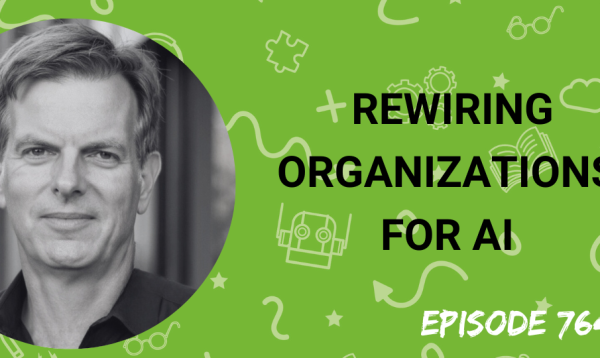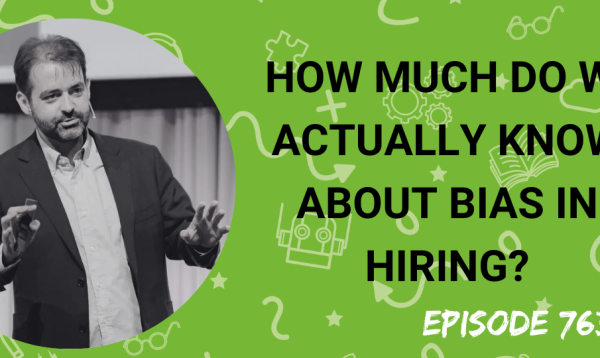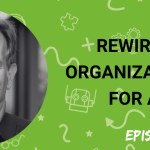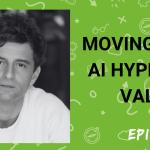Data based intelligence is a critical part of the modern world, but historically talent acquisition has tended to be based on gut feel and lived experience, making it very slow to wake up to the new realities of data-based decision making. Thankfully things are now changing, and one aspect of this change is the rise of talent intelligence as a talent acquisition business function.
My guest this week is Marlieke Pols, Talent Intelligence analyst at Philips. Marklieke recently authored a whitepaper that Phillips has published aimed at helping employers better appreciate the immense value of talent intelligence as a critical part of any talent acquisition strategy.
In the interview, we discuss:
- What is talent intelligence?
- Why instinct is not good enough
- Difference between talent intelligence and people analytics
- The key benefits, KPIs and ROI of talent intelligence
- Data sources
- How many employers are using talent intelligence
- Building the business case
- The skills needed in a talent intelligence team.
Download the Philips Talent Intelligence Whitepaper
Subscribe to this podcast in Apple Podcasts
Transcript:
Matt Alder [00:00:00]:
Support for this podcast is provided by Smart Recruiters Future. Proof your talent acquisition with a modern TA suite with everything you need to attract, select and hire the best talent. Over 4000 leading brands like Bosch, IKEA, LinkedIn and Visa Trust smart recruiters to deliver hiring success with them on a global scale. This February, Smart Recruiters hosts Hiring Success in San Francisco and it is one of the best, best TA events of the year. Meet over a thousand influencers, thought leaders and TA practitioners and help shape the future of talent acquisition. Visit hiringsuccess.com that’s hiringsuccess.com to secure your tickets and use the code XYZ for an exclusive 30% off the ticket price.
Matt Alder [00:01:14]:
Hi everyone, this is Matt Alder. Welcome to episode 238 of the Recruiting Future podcast. Data based intelligence is a critical part of modern business. But but historically, talent acquisition has tended to be based on gut feel and lived experience, making it very slow to wake up to the new realities of data based decision making. Thankfully, things are now changing and one aspect of this change is the rise of talent intelligence as a talent acquisition business function. My guest this week is Marlieke Pols, talent intelligence analyst at Philips. Marlieke recently authored a white paper that Philips has published aimed at helping employers better appreciate the immense value of talent intelligence as a key part of any talent acquisition strategy. Hi Marlieke and welcome to the podcast.
Marlieke Pols [00:02:15]:
Hey Matt, thank you for having me.
Matt Alder [00:02:17]:
An absolute pleasure to have you on the show. Could you just introduce yourself and tell us a bit about what you do?
Marlieke Pols [00:02:24]:
Yes, of course. So my name is Marlieke Bols. I’m working as a talented intelligence analyst for Philips. I’m working in a of Toby Kolsha for almost one and a half years already. Time flies.
Matt Alder [00:02:36]:
Absolutely. And for people who are not familiar with what talent intelligence actually is, could you just give us a quick overview of what it is, what you do exactly and why it’s important?
Marlieke Pols [00:02:47]:
Yes, of course. So within Philips, our team is responsible for collecting, analyzing, but also presenting data with regards to the external labor market. And what we do with that data is we try to influence and inform on strategic, strategic business decisions and questions that are being made within Philips. And our team really works on a variety of projects such as location studies, merger and acquisition, due diligence, but also competitor analysis and many more. So we really use data and try to put that for strategic business decisions.
Matt Alder [00:03:28]:
Fantastic stuff. And we’re going to sort of dive into some of the specifics about what that actually looks like as we sort of move through the conversation. Before we do, you and the team of Philips have recently produced a white paper on talent intelligence. It’s quite unusual for an employer to produce a white paper for their sort of peers in the market. What’s the story behind it?
Marlieke Pols [00:03:49]:
Yeah, so talent intelligence is still a very innovative new field, at least in the way that we mean. What we mean with talent intelligence and what we really mean with that is the application of external data relating to people, but also to skills, jobs, functions, competitors and geographies to drive those business decisions. And some organizations out there, they have set up their own talent intelligence department. Some organizations use external companies to gain those insights. But there are also still a lot of companies out there that have no idea or no clue what talent intelligence is all about and how this can really influence strategic business decisions and strategy making. And within Phillips, we have gone through some changes in all the years that we exist, but not only has our organization changed, but the environment in which we operate is really changing as well. So due to all of these changes, we as an organization are looking for new skills, new roles, but also new technologies that did not even exist years ago. And also due to all those technology advancements, there’s a broader product landscape for talent intelligence which also makes it possible for us to access data and transfer it into actionable insights and intelligence. So an instinct or feeling that so many of us regularly have is no longer enough in this time of continuous change. So there really needs to be precise and compelling data to back up decisions. And as my manager, Toby Kosher also wrote in the white paper, is that we have seen that talent intelligence has evolved over the years, Phillips, and inclusion is no longer seen as really value added, but it’s seen as a prerequisite when designing our talent sourcing strategy. And with Philips, it’s not only the only company that’s recognizing the added value of talent intelligence, but many other companies out there see this, and that’s a long story to let you know that that’s a little bit of reason why we’ve created this white paper to really inform professionals and organizations that have an interest in this subject on the possibilities around talent intelligence and really sharing best practices so that they can see the value added that it might bring to their organization.
Matt Alder [00:06:20]:
It’s an absolutely fantastic white paper and it’s brilliant that Philips is sharing its experiences with the marketplace. Just I suppose to talk a little bit more about the specifics around talent intelligence. There’s obviously a lot of coverage, a lot of talk about people analytics in the talent area. How is talent intelligence different to people analytics?
Marlieke Pols [00:06:43]:
I think if you would draw a thick line between those. I think the main difference is in the usage of internal data and external data. You know, it can be different in how an organization is structured, but based upon the input in white paper, People analytics is mostly inward looking and more focused on current employees and using internal tools and using internal systems. While talent intelligence, on the other hand, focuses more on the external market using external data tools and sources. And although they might use different approaches, it’s very important for if you have an organization where both of them are part of that, they are partnering up and really try to understand a bigger picture so you have a comprehensive understanding of the total workforce.
Matt Alder [00:07:34]:
So tell us a bit more about the benefits of talent intelligence. What can it provide for an employer?
Marlieke Pols [00:07:40]:
Yeah, I’m of course obviously completely biased with that, but I think the key benefits, what we’ve obviously seen within Philips, but also based upon feedback from all the participants in the white paper, is that having that data to back up business decisions, that can help organizations in saving cost, for example, choosing the right location where talent can or cannot be found. But it can also help organizations to find the skilled talent that they need to have to be innovative in this continuous changing income benefit environment where we are in, and also making smart talent decisions in the end, that can save the organization a lot of money.
Matt Alder [00:08:25]:
So I suppose going a bit deeper on that, what are the sort of specific service offerings and deliverables that you have as a talent intelligence team to the business?
Marlieke Pols [00:08:36]:
I think what we have is pretty similar to what the participants in the white paper also have. And I think the main focus from the participants in the white paper was very much focused on location feasibility and location studies. And this is more like the type of research that you do into what the best location is for certain skills or functions compared to other locations. And you can investigate a variety of parameters. And I think also the question, what I hear so much lately is then I’m talking to a person at a specific company and then they’re saying, yeah, we’re expanding our offers in this location. And then I’m asking why that particular location? And then they say, yeah, because we already have a headquarter there. But the question that people would need to ask themselves is that also the right location where you can find the talent that you need to have to be fit for future? I think that’s also One of the reasons why those location feasibilities in those location studies are really number one, secondly are really competitor insights. So knowing what the competitive density is in a certain location, but also is a competitor looking for similar roles and skills as you, can we really match the compensation and benefits offerings or can we differentiate from that? And I think the third one is very much around talent insight and or talent availability. So what’s the talent availability for certain skills now and in the future? Is it difficult to hire this talent? And all kinds of similar questions like that. And if you look at research firms that can be a little bit different. I think the number one that we also see in the white paper is also very much location feasibility or site selection. But the number two and three are more like strategic workforce planning. And what we see there more compared to corporate talented intelligence departments is more the diversity intelligence.
Matt Alder [00:10:37]:
You mentioned that talent intelligence is based on external data sources. What are the data sources that you use and what do you do if there’s not enough external data available?
Marlieke Pols [00:10:50]:
Yeah, that’s indeed a very good question. I think we within Philips, our main Data sources are LinkedIn and Telenodeon and a variety of publicly available sources. So data sources that are just accessible for everyone. And I think if you also look at the white paper for the participants, the main data sources There were also LinkedIn and publicly available data. And the reason why, why that’s so important is that if I conduct a research, I think for an average research project, obviously a little bit depending on the scope and the parameters, I use at least 60 different sources and that is reading myself in the topic, reading latest trends, what’s going on, validating data. And if there isn’t enough data or the data isn’t accurate, or I don’t feel confident about the data, then I don’t report on it. So I really then go back to my stakeholder, inform them what I can and cannot do. And the reason behind that, and I think also the reason behind that helps the stakeholder in understanding why I don’t want to report on certain data where I don’t feel confident with and applying reasonable judgment and making any caveats clear from the outset. That’s very, very important. And it’s also one of the best practices that’s shared in the white paper. And I think I’m also very happy to know that I’m not the only one that sometimes struggles with data or seen avail. And that’s really the key challenge for talent intelligence professionals. As written by the participants from the white paper.
Matt Alder [00:12:31]:
How do you measure the ROI of talent intelligence? What are the sort of KPIs of a successful team? What kind of successes do Philips have with it?
Marlieke Pols [00:12:42]:
I think overall it can be, you know, KPIs can really differentiate per talent intelligence organization and per research firm because they obviously also align to the business goals. So the information share in the white paper is also very much anonymous and very general. But I think the KPIs that we’ve mentioned in the white paper, they are very much optional KPIs and based upon the feedback that we received, and I think what we really see coming back in multiple organizations are really around cost avoidance, the impact of research conducted and Net promoter score. And also the net promoter scores is something that we do within Philips. And it’s a very valuable measurement for us to see how our research has been landed and what our stakeholders are doing with that. And the financial piece around that cost avoidance is also something we see going back in the return on investment, obviously. So what’s the estimated financial or commercial impact? What’s the cost avoidance versus research firms? And then I’m obviously speaking from a corporate talented intelligence department point of view. And when the research is regarding site selections, the number one service offerings that we are doing, are there lower operating costs achieved or what are the cost implications for choosing the wrong locations? Those are type of things that we calculate. And not only we, but the participants from the white paper as well. But having that said, measuring the success or Even defining those KPIs for research projects, it can be challenging. The cost can really be defined in most cases, but that benefit realization is hard to grab for most projects and sometimes it can be very difficult, difficult to materialize. So this is at least a good starting point. But it is a challenge that even more mature talent intelligence departments are still figuring out in the best way how they can measure this.
Matt Alder [00:14:45]:
So I mean, how widespread is the use of talent intelligence? Are there many employers using it?
Marlieke Pols [00:14:51]:
I think, you know, due to other changes that are currently happening in the environment where companies operate. Think about, you know, the global unemployment rates, economic growth, the aging populations, many more, the technology advancements. We really do see the need for talent intelligence growing. And Horsefly analyzed the growing trend in talent intelligence and the data that’s been presented in the white paper where we spoke about earlier, shows us really that as of 2017, the occurrence of talent intelligence appearing within profiles online or across CVs, that is really, really increasing. And when you look at the data, you even see a sharp increase in 2018. Also if you just would open like LinkedIn jobs or indeed jobs and do like a random search on the term talent intelligence. So then I’m really talking about talent intelligence in a broad sense, not really deep diving into specific skills and responsibilities. But you see that many companies out there are looking for talent intelligence professionals. I think if you now look at LinkedIn vacancies, you see that LinkedIn jobs, my apologies, you see that SAP is looking for talent intelligence. Lease Facebook has open vacancies. I think Verizon just had a vacancy, Johnson and Johnson, Qualcomm. And again, it’s in a broad sense maybe not specifically the same thing as what we do within Philips, but we do see more and more companies setting things up. We also had like after the white paper, people that were very inspired around talent intelligence and that were really thinking about setting something up within their company and looking at the possibilities on how they can set that up. And then besides that, you also have companies that might not conduct intelligence themselves, but they outsource it and they use the knowledge and resources of a research firm to also have the talented intelligence knowledge for strategic business decisions.
Matt Alder [00:17:04]:
So for employers considering building their own talent intelligence capabilities, if they’re building a talent intelligence team, what kind of skill sets are needed to do this properly?
Marlieke Pols [00:17:15]:
Well, I think the first thing that if an organization really wants to set up something like that is that they need to show the value of talent intelligence to the leadership team. And that can be done by investigating a current problem or a question within an organization and really use talented intelligence insight for that. And if you don’t have a team yet, there are a lot of research firms out there that are probably more than happy to help people with that. But showing that example is absolutely vital. And I think secondly, if an organization has decided to set up something like that, either in house or source, it’s very important to have a mixture of skills in a talented intelligence team. We’ve asked a lot of the participants, what are the skills that you need? And I think there’s so many different skills that you need. So you need to have people that have skills in like data analyzing, modeling or wrangling, maybe even data science, depending on how mature your talented intelligence department is, maybe even statistics. But you also need to have people in your team that have those consultancy skills that are able to influence, that have problem solving skills, that have skills in project management and stakeholder management. So there’s not like really that we can say, okay, this is a card with all the skills that you need to have I think it’s very, very important that you have a team that has a mixture of these skills that you can use in the full purpose of talent intelligence within an organization.
Matt Alder [00:18:52]:
Final question. What does the future look like for talent intelligence? What sort of trends are you anticipating?
Marlieke Pols [00:18:59]:
Yeah, I think that’s very much focused on my personal opinion and of course the feedback from a white paper. But as we discussed earlier, talent intelligence is growing. That’s just something that’s happening at this moment. And also the feedback that we receive in the white paper is showing that. And I think by the end of 2020, maybe even 2021, the majority of the larger organizations will use talent intelligence to inform strategic business decisions. And maybe some mid sized company or smaller companies will maybe use research firms more for talent intelligence. It has just evolved over time and it will become more and more critical for organizations and their HR departments. But I do believe it’s still an emerging field. It’s still really trying to find out what it is that it wants to be. And I think that’s also the reason why it’s so helpful to make a white paper where we share best practices in. And also due to technology and all those new technology tools that are popping up, new vendors, new intelligence data platforms, there will probably also be a general upscaling amongst HR and talent leaders in how to really interpret the data as well as we as talented intelligence professionals need to upscale to become really, really experts in our subject. The second one, and that’s also something what we see here as well is building up more partnerships with for example, corporate strategy teams, but also such as other departments within your organization, think about real estate rewards and people analytics. We really think that that will become more critical as well. And also of course the increased levels of automations within the talent intelligence field overall. And I think those advantages of external market data in relation to the workforce will just become increasingly more critical for organizations. So they really, really are prepared, prepared for the future of work.
Matt Alder [00:21:12]:
Marlieke, thank you very much for talking to me.
Marlieke Pols [00:21:15]:
You’re welcome Matt. And thank you so much for having me. And I hope this has been very helpful for our for the listeners.
Matt Alder [00:21:22]:
My thanks to Marlieke and I’ve put a link to the Philips white paper in the show notes. You can subscribe to this podcast in Apple Podcasts or via your podcasting app of choice. Please also follow us on Instagram. You can find the show by searching for recruiting future. If you’re a Spotify or Pandora user. You can also listen to the show there. You can find all the past episodes@www.rfpodcast.com. on that site, you can subscribe to the mailing list and find out more about Working with me. Thanks very much for listening. I’ll be back next week and I hope you’ll join me.








